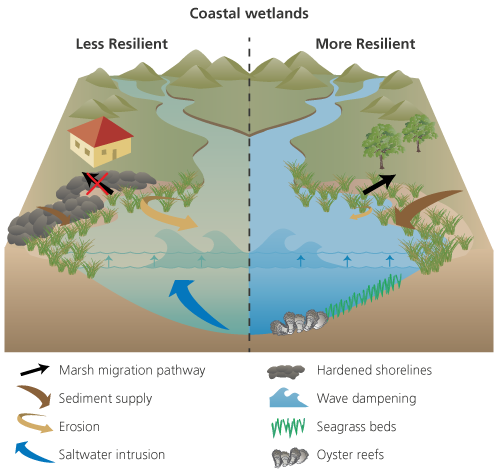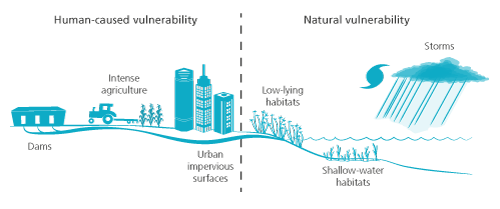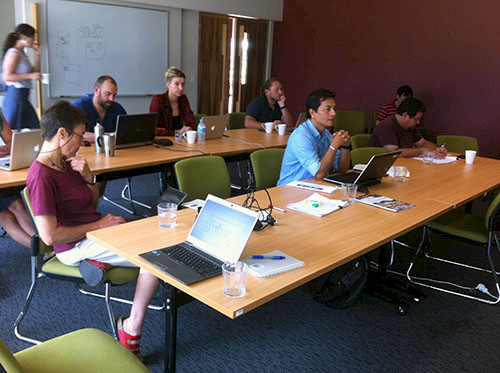Climate Change and resilience create new challenges in tracking ecosystem health status
Heath Kelsey · | Environmental Report Cards | Science Communication |Understanding resilience to climate change effects is critical to the future of environmental assessment and reporting. Changing air and water temperature, precipitation patterns and storm frequencies, CO2 concentrations, and sea level rise will add significant pressure to the natural and engineered systems that provide us services. Understanding system resilience to these changes is important to developing relevant monitoring, assessment, and reporting frameworks.
Resilience is often discussed in terms of resistance and recovery, and function and form. Resistance is the ability of a system to remain unchanged in the face of changing conditions, and recovery is the ability to revert back to original condition following alteration. This condition can be viewed as either function or form: a system can change form but provide the same ecological function. For example, species composition in a seagrass bed may change as a result of changing temperature or salinity, but the habitat function of the seagrass bed may remain essentially intact. This can be evidence of resilience, or evidence of change, depending on your definition.

Climate change will clearly impact the systems that provide services and support our management goals, which intensifies the need to track current status. Knowledge of current goal achievement status is one necessary precursor to understanding the potential effect of climate change, and understanding resilience to climate change impacts is the other. Measures for resilience are still in their infancy – at the recent Conference on Ecosystem and Ecological Restoration (CEER) in New Orleans, July 28 to August 1, 2014, several talks discussed the metrics for measuring resilience, and it was clear that we are still working toward common languages, definitions, and methods. Metrics discussed included time required for a system to return to its original state after perturbations, and the ability of changed systems to provide similar ecosystem services following disturbance. IAN is contributing to this discussion through work on two report card projects that include specific measures for resiliency, but with slightly different approaches.
For the Chesapeake Bay Report Card, we are developing a new Climate Change Resilience Index for submerged aquatic vegetation, wetlands, shellfish and fish. This index focuses mostly on assessing impacts to these resources and measuring environmental aspects that can add to their ability to resist or adapt to changes in temperature, storms and associated flooding, salinity, and sea level. For this project, we are using existing data series to measure long-term impacts already being observed, and using research results to evaluate the prospects of some of these resources to adapt to changing conditions or provide similar function.

For the Great Barrier Reef Report Card, we are assisting the Great Barrier Reef Foundation in the development of a Reef Resilience Index. This project is evaluating the specific aspects of reef ecology (including calcification, seagrass reproduction, and habitat structure) to adapt, resist, or recover from disturbances related to CO2/pH, temperature, and storm impacts. Research into these factors is ongoing and will be used to develop a robust index that reflects resilience of this iconic set of ecosystems.

About the author
Heath Kelsey

Heath Kelsey has been with IAN since 2009, as a Science Integrator, Program Manager, and as Director since 2019. His work focuses on helping communities become more engaged in socio-environmental decision making. He has over 15-years of experience in stakeholder engagement, environmental and public health assessment, indicator development, and science communication. He has led numerous ecosystem health and socio-environmental health report card projects globally, in Australia, India, the South Pacific, Africa, and throughout the US. Dr. Kelsey received his MSPH (2000) and PhD (2006) from The University of South Carolina Arnold School of Public Health. He is a graduate of St Mary’s College of Maryland (1988), and was a Peace Corps Volunteer in Papua New Guinea from 1995-1998.